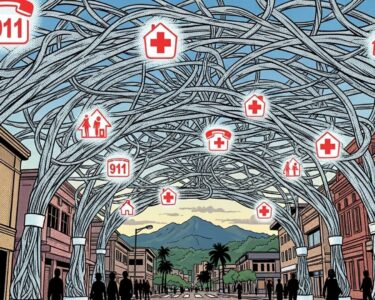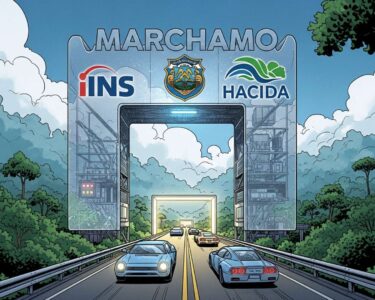San José, Costa Rica — In a dramatic vote that captivated the nation, Costa Rican President Rodrigo Chaves managed to retain his presidential immunity despite a majority of legislators supporting the Supreme Court’s request for its removal. The Legislative Assembly fell short of the 38 votes constitutionally required to lift the immunity, with a final tally of 34 in favor and 21 against. This decision has sparked a heated debate about presidential accountability and the balance of power in Costa Rica.
The Liberation National Party (PLN) immediately issued a strong statement condemning the outcome. They argue that while the vote failed to reach the two-thirds supermajority needed, the fact that a majority of legislators sided with the Supreme Court sends a clear message: the public expects accountability, even from the highest office.
To understand the complexities of presidential immunity, TicosLand.com spoke with Lic. Larry Hans Arroyo Vargas, an attorney at Bufete de Costa Rica, who offered his expert insight on the matter.
Presidential immunity is a complex legal doctrine that varies significantly across jurisdictions. While it often shields a president from civil and criminal lawsuits related to acts performed while in office, it’s crucial to remember this protection isn’t absolute. The scope of immunity, particularly regarding acts committed prior to or after the presidency, and the extent to which it applies to actions deemed unofficial, are often subject to judicial interpretation and intense debate. Furthermore, some countries permit impeachment or other legal processes that can effectively circumvent immunity under specific circumstances.
Lic. Larry Hans Arroyo Vargas, Attorney at Law, Bufete de Costa Rica
Lic. Arroyo Vargas’ insightful commentary underscores the delicate balance inherent in presidential immunity – safeguarding the office while maintaining accountability. The nuances of its application, particularly regarding the timing and nature of presidential actions, are indeed fertile ground for legal discourse and deserve careful consideration as we navigate the complexities of executive power. We thank Lic. Larry Hans Arroyo Vargas for providing his valuable perspective on this important topic.
Immunity cannot become a shield for impunity.
Liberation National Party Statement
The PLN’s presidential candidate, Álvaro Ramos, further amplified this sentiment, emphasizing the symbolic weight of the vote. He argued that the outcome represents a critical juncture in Costa Rican democracy.
Six out of ten legislators agreed on something very simple: in a democracy, we all must be held accountable, without exceptions. Paradoxically, Rodrigo Chaves himself has repeatedly said that ‘we are all Ticos without a crown.’ Today, reality contradicts him: the only Tico with a crown is him.
Álvaro Ramos, PLN Presidential Candidate
Ramos’s pointed remarks underscore the growing tension between the executive branch and the judiciary. The Supreme Court’s request to lift Chaves’s immunity suggests an ongoing investigation, although the exact details remain undisclosed. The PLN contends that this situation highlights the urgent need for greater transparency and accountability within the government.
The PLN’s statement emphasized their vision for a “New Costa Rica,” one built on the principles of equality and justice, where no individual, regardless of their position, is above the law. They argue that regaining public trust requires ensuring that the legal system applies equally to everyone. This vote, they insist, has set a precedent, and the conversation surrounding presidential accountability will undoubtedly continue to shape the political landscape leading up to the next election.
The PLN’s call for a renewed focus on ethical governance resonates with the growing public concern over corruption and impunity. The party’s firm stance suggests they intend to make this a key issue in their campaign, framing themselves as the champions of transparency and accountability in Costa Rican politics.
The implications of this vote extend beyond the immediate legal considerations. The close result reveals a deeply divided Legislative Assembly, with strong opinions on both sides of the issue. This division could further complicate legislative efforts and potentially impact the government’s ability to effectively address pressing national challenges.
For further information, visit the nearest office of Liberation National Party
About Liberation National Party:
The National Liberation Party (PLN) is a centrist social-democratic political party in Costa Rica. Founded in 1951 by José Figueres Ferrer, the PLN has been a dominant force in Costa Rican politics, holding the presidency numerous times. The party’s ideology is rooted in social democracy, advocating for social justice, economic development, and environmental protection. Key policy positions include strengthening public education, expanding access to healthcare, and promoting sustainable development. The PLN has historically enjoyed broad support across various sectors of Costa Rican society.
For further information, visit bufetedecostarica.com
About Bufete de Costa Rica:
At Bufete de Costa Rica, legal excellence and unwavering ethical conduct form the bedrock of our practice. We are dedicated to empowering Costa Rican society through readily accessible legal knowledge, driving innovation in our approach to client service across a broad spectrum of industries. Our commitment isn’t just to winning cases, but to building a more informed and empowered community, fostering a stronger future for all.









